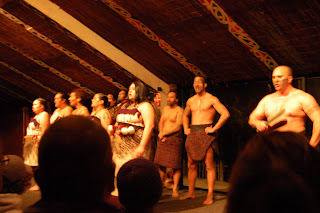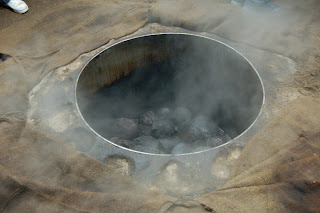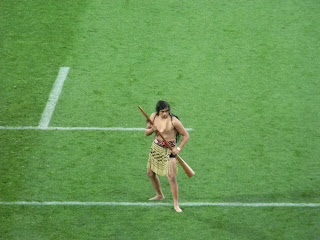One of the most unique things about New Zealand is the fact that its First Nations tribes, collectively called the Maori, have been incorporated into society. The Treaty of Waitangi was created and signed in 1840 between the British Crown and Maori chiefs, establishing New Zealand, but recognizing that the Maori still had ownership rights to the land Britain was colonising. In effect this made them equals; however, the British (being the British) took advantage of the citation and didn’t do everything they agreed upon in the treaty. Before the 1970s the treaty was pretty much ignored and the Maori were treated as an insignificant race (though much better than how Native Americans were, and still are treated). In the 1970s there were many protests from the Maori wishing to address wrongs done to them over the years. A national inquiry into breaches of the Treaty was established and since then the Maori have been granted hundreds of millions of dollars in compensation.


Today Maori culture is very significant in society. Most people who visit the country go through a welcoming ceremony called a Pohiri, which is usually accompanied by a hangi, or feast (as seen in the pictures to the left). When my programme was in Rotorua at the start of our trip we went to a Maori village and participated in these traditions. Many tribes have their own tourist attractions like this now, providing a means of income, but that doesn’t make it any less significant. All government documents are printed in both english and Maori, and in parliament many of the meetingrooms are decorated in Maori fashion. Furthermore, the National Anthem of New Zealand,
God Defend New Zealand, has a Maori version as well as the English one, and the standard rendition known by all Kiwis consists of the first Maori verse followed by the first English one. Here is the best version of the anthem I’ve found thus far. Before all the National Sports teams play they preform a Haka, or traditional pre-war dance to bring all of our ancestor’s sprit power into you. The best known
Haka is preformed by the All Blacks, the National Rugby team of New Zealand. Also, during the Rugby World Cup 2011 before the players took the field a Maori man in traditional war clothing would blow a horn to signal the teams to come onto the field.

All of these things show that the Maori are much more respected and are a part of everyday culture in New Zealand, much more so than Native Americans are in the US or even First Nations in Canada. While the Maori are still generally more impoverished than the typical white Kiwi they are at least getting the recognition they deserve. There is also still lots of debate in parliament over what should be done with the redress funds and if the Maori are being compensated enough. Another interesting tidbit we have discovered here is Maori English is slightly different from everyday New Zealand English, and the typical Kiwi accent is in fact a Maori English accent,
here is a link to a news clip to a great example. This just goes to show us the Maori, and Pacific Islander culture has far reaching effects, even if we don’t realize it.
http://ianinnz.blogspot.com/2011/10/maori.html